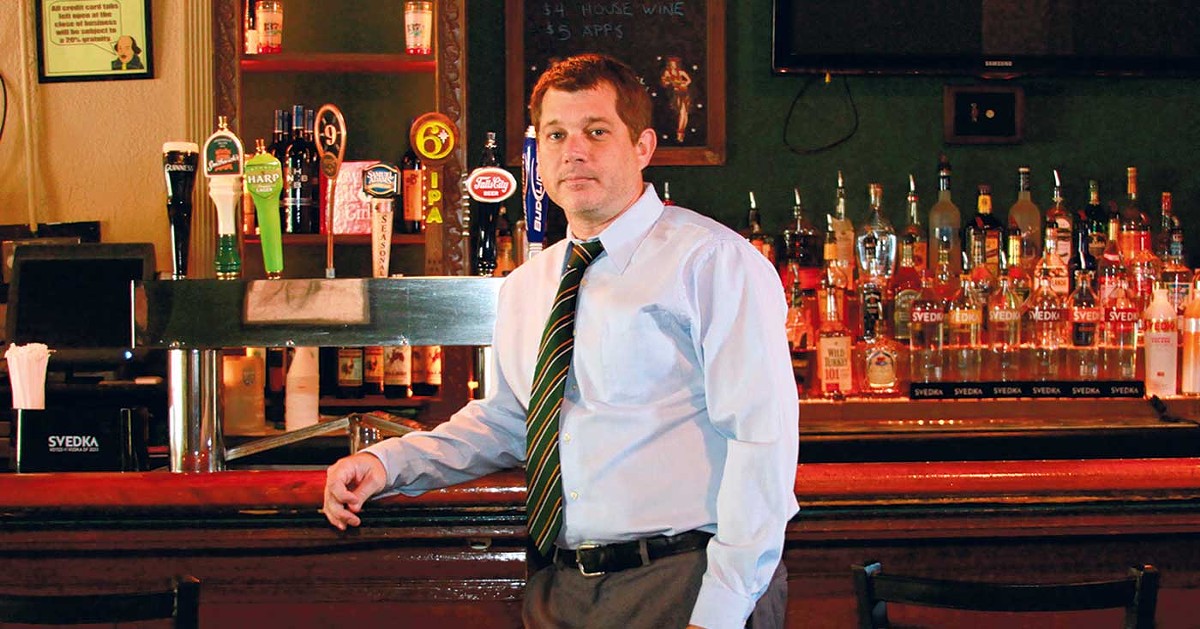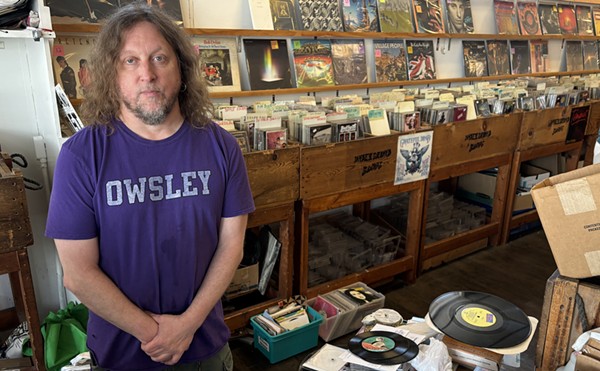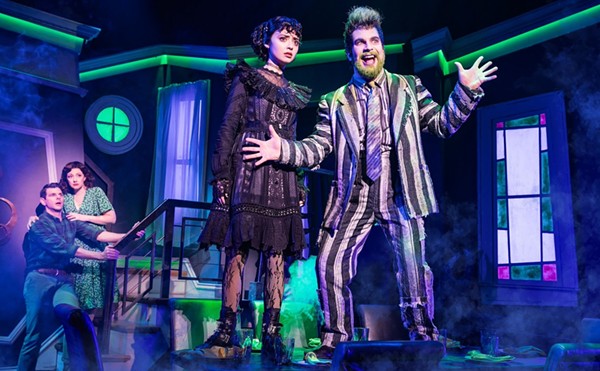And as I have told my friends to the point of tedium, one of the most exciting nights of theater I have ever experienced took place November night in 2014 when the Spanish language company Teatro Tercera Llamada premiered “Monstruos en el Closet, Ogros baja la cama” (Monsters in the the Closet, Ogres under the Bed),” a powerful reflection on the 9/11 attacks by the Venezuelan playwright Gustavo Ott
I was skeptical going in. Prior to that night, the TTL productions I’d seen had been pantomimes, and this was their first time delivering a text-based Spanish work with English language supertitles. (In fact, it was the first time any company in Louisville did this.)
I expected a thin opening night crowd. I was wrong. The minute I walked through the Bard’s Town front door into the bar/restaurant area I knew something special was happening. The place was packed – and the buzz of conversation was mostly in a language where I can barely do more than express polite greetings and requests. A few of the people I knew from other contexts, but most I had never seen in a theater.
Upstairs, the theater was full, and the excitement was palpable. It’s easy to profile the opening night audience for a production by an established company, the subscribers, donors, board members, people connected with the production, and theater devotees, all comfortable in their element. But that night it felt like we were all sitting on the collective edge of our seats. Even without the supertitles, it would have been a riveting experience just to be there in that room with those performers (including live musical accompaniment by Jon Silpayamanant) and that crowd.
Haydee Canovas, playwright, actress, and co-founder of Teatro Tercera Llamada, has vivid memories of that night.
“Being at The Bard’s Town felt like we were on Broadway in New York City. We felt like we had made it. You can look at us now, but it starts off like that – and we had a willing, willing ally in Doug Schutte. He wanted to practice his Spanish with us, so we practiced our Spanish with him – and he was very generous with us. The first time that we were there, Doug Schutte had a bucket of little champagne bottles. We didn’t expect anything like that, and it was so heartwarming.”
In the following years, Teatro Tercera Llamada would go on to mount more productions at The Bard’s Town, including a superb festival of Spanish language ten-minute plays, all by local playwrights, and all based on their lived experiences.
My first interaction with Doug was in 2010 when I reviewed the restaurant operation at The Bard’s Town for The Courier-Journal. It happens that I was also pretty skeptical about The Bard’s Town and its business model on that occasion, as well. Doug and his founding partners Scott Atkinson and Jon DeSalvo had announced a business plan that sounded very much like a newfangled dinner theater (with a lounge suitable for music and comedy performance as well), but the theater was not yet open. The menu was a pun-rich affair with dishes like “First Folio Fish (Shylock’s favorite, because it’s a half-pound of fish),” “Merry Fries of Windsor,” and “The Taming of the Stew.”
In my review, I made a dismissive comment about some crostini – of all things. And then shortly thereafter Doug sent me a whimsical note discussing the dramaturgical roots of the menu and apologizing for the crostini.
Over the years, we became what I guess you’d call “professional friends.” We never sat down together, and neither of us knew anything other than what was public knowledge of the other’s public life. We mostly communicated through late-night texts and messages. And every time I can remember talking to Doug face-to-face he was wearing an apron and cooking something, carrying a wrench and fixing something in the building, or handing out tickets and programs at the door to the upstairs theater (and for a time prior to the pandemic, he allowed my band to use his lounge space every month or so).
But I saw and reviewed Doug Schutte’s work as a playwright, performer, director, and producer: his dizzying virtuoso one-man rendition of the Christmas classic “It’s a Wonderful Life”; the equally dizzying, brilliant perennial “The Kings of Christmas;” “Misses Strata,” his sharp-edged =update on the Aristophanes comedy; and his Shakespearian tour de force “Chasing Ophelia,” an epic romp that played not only at The Bard’s Town but on the Kentucky Shakespeare stage in Central Park. And of course his outrageously smart “Oedipus Rex: The Original Motherf***er,” a rollicking crowd-sourced update of Sophocles’ tragedy where every time Oedipus reached a crossroad the audience votes to determine his fate (and every time the word “motherf***er” is uttered on stage the audience raises a glass).
Schutte’s death on February 23, at age 47 came as a hard hit for everyone who had any connection whatsoever not only to him directly but to Louisville arts and culture.
If you use social media, you will find scores of tributes to Doug from people who knew him as a football coach and teacher, and through his long multi-faceted career in theater. Those tributes are both sorrowful and inspiring, and more than anything else they confirm the extraordinary impact Doug and the Bard’s Town had on inventing Louisville’s theater scene as it exists today.
Over the last few days, I spoke with many people who worked closely with Doug over the years. Those were long conversations that will take a while to transcribe in total, but here I want to share some of what I’ve heard from some of those people.
First some numbers.
This is somewhat dated information, from one of Doug’s Facebook posts. At the time of posting, The Bard’s Town had presented 19 world premiere full-length plays; 72 ten-minute plays, all by Kentucky playwrights; 32 full-length plays by Kentucky playwrights; produced and/or hosted 400 weeks of theater; produced more plays by female playwrights than any other organization in the state; hired more female directors than any other area theater – 25% of whom were first-time directors; and had been one of the first five theaters in the world to produce plays by a litany of playwrights whose work had earned a slew of prestigious awards. And the company had paid out more than $100,000 in stipends to actors, directors, and support staff – which is no small sum for a small arts organization. That post also listed some fifty other arts organizations, from small to large, with whom The Bard’s Town had supported with space, equipment, and support.
Schutte’s support for those organizations is actually impossible to quantify – because he himself didn’t think that way. The hard fact about theater in this city is that the barriers facing independent producers trying to put on a play are formidable. Most venues require up-front deposits and minimum guarantees against a percentage of any revenues a play might generate (that is if ticket sales are sufficient to generate more than the deposit).
Schutte didn’t operate that way. Larry Muhammad, playwright, producer, and founder of Kentucky Black Repertory Theatre (and former Courier-Journal writer) produced a number of shows on The Bard’s Town stage. He compared The Bard’s Town to another beloved and influential Louisville venue. “The Bard really took the place of the Rudyard Kipling,” he said. “It became the Mother Church. It just kind of drew Louisville’s theater community into it. Doug just made it so easy for us. Other venues have lots of upfront expenses and rules and require you to hire their staff and things like that. Doug did things differently. It was this funky little welcoming place. You didn’t have to put any money up-front. There weren’t any hoops to jump through, and we could bring in our own set and do our own lighting and sound people and things like that. I don’t know what his business plan was, but it wasn’t about the money. It was about him serving the theater community. I can’t even imagine how hard he was working just to keep that place open, to keep the lights and heat on and to schedule all those shows from all those different companies and to put on his own shows and that one-man Christmas show.”
“And,” Muhammad, continued, “The Bard wasn’t just about theater. I saw Louisville Jazz Society concerts in the lounge, and he had improv artists and stand-up comics and open mics in there all the time.”
Indeed, anyone who ever looked at the events calendar on The Bard’s Town website knows that it was a wall-to-wall tangle of events across the spaces and often involving tight transitions between, say, a concert at 7 and stand-up comedy at night. The Lounge space was often packed for performances by the Troubadours of Divine Bliss, and if you attended the frequent comedy and improv shows, you might have great performances by folks like Alphaeus Green, Jr., or early performances by a slew of artists (ike Raanan Hershberg, who these days gets rave notices in the New York Times, and a couple of months ago, after Schutte announced that The Bard would be closing and relocating, returned to Louisville to play one last gig on the stage where he got started.
Greg Maupin, the co-founder of the much-missed theater company Le Petomane (and now an on-stage mainstay and long-time resident dramaturg for Kentucky Shakespeare), also cited The Bard’s town as being an inheritor of the Rud’s values and tradition. In fact, Le Petomane played The Bard’s Town early on.
Said Maupin, “I think the thing Doug had in common with Ken Pyle [proprietor, with his wife Sheila, of the Rudyard Kipling] is that both of them were sort of backed-in to doing ‘business-y’ things, which were clearly necessary in order to do what they really wanted to do. But those business things were not the reason they signed up to do that work. I know Doug ran the restaurant successfully, but his heart was always upstairs. And I think Doug had a thing that a lot of us in theater have, which is a really poor ability to have good work/life boundaries. I think for him was to have a show around. And for him, one of the important things about The Bard’s Town was that he was providing side jobs for actors that he liked working with. He was providing space for companies that he courted – he very actively courted Le Petomane when he was opening up. He even had us over to look over the upstairs and talk about the plans. He wasn’t asking for approval, but he was looking for advice on things like the stage and booth and making sure he wasn’t missing anything. He was like Ken and Sheila and just loved having people around.”
If you ask around (or look at social media) you’ll discover plenty of people expressing themselves for those side jobs over the years. But a couple of folks became mainstays both behind the bar and on stage.
Ryan Watson moved to Louisville from Madisonville in 2010, about a month before The Bard’s Town opened. Watson's stepfather was on the Board of the Kentucky Theatre Association – an organization that Schutte had previously served as Executive Director. And since Watson had already embarked on an acting career (he had graduated from Western Kentucky University, and then acted for a season with the Kentucky Repertory Theatre in Horse Cave) it seemed a good connection to make.
When Watson first visited the space, the three founding partners were installing drywall in what would become the Lounge. They sat and chatted, and Watson became a founding staff member who worked through the restaurant’s soft openings – including working through the customary crises that openings entail.
One of The Bard’s Town’s staple features over the years was a series of comedy Roasts – even Watson said that even when the power failed, the Roasts went on, memorably including an early flashlight-lit Roast of Batman in the early days.
“Doug was just uncompromisingly stubborn,” said Watson. “Even when it seemed like there was no possible way to do something he would make it happen.”
But Schutte was also flexible. “When we opened,” said Watson, “ he told us we could wear anything – as long as it was black. As a twenty-two-year-old, I pushed that as far as I could – and came to work wearing black overalls, or just any weird thing I could find that was black – but no matter what it was he’d let us wear it. He gave us that freedom of expression. And he liked hiring all kinds of people. My first experience working with a transgender person was with a co-worker in the kitchen and I was just so grateful to be working in a place where it just naturally felt like everyone was safe. And it just grew over time, an understanding that The Bard’s Town was a safe community for everybody, a place where people could do their art and be accepted.”
Watson continued, “It was a melting pot. Doug was a football coach [he coached and played on championship teams at St. X] who loved Shakespeare and studied at The Globe. Where do you find that? Where do you find a football coach who has studied at the Globe Theatre?”
Schutte’s hard-nosed pugnacity was often on display in his battles with the building’s physical plant, said Watson. “A few years back the walk-in cooler went out, and Doug investigated and engineered a solution that involved cutting a hole in the wall and installing some computer thing that kept working for the rest of the time we were open.”
Watson is also an accomplished theater professional who split his time between the stage and the bar and acted in many of the theater’s signature productions, including Schutte’s own works and the Ten Tucky Festival of short plays by Kentucky writers. Whether staging his own play or hosting other companies, said Watson, “He was always focused on making sure a play had what it needed. He was a guy who would make sure every play had the props and costumes they needed, and the rehearsal time, and when he was directing he’d make sure that all the players were getting what they needed to be successful.”
Another theatre professional who split time between staff responsibilities and the stage was actor and playwright Corey Music, who appeared in “A Bright New Boise” – a play by Samuel D. Hunter that won an Obie Award in 2010, and in 2011 was one of the first of many extraordinary new works that would get their first (and often, only) Louisville production at The Bard’s Town. Music has appeared in a long list of The Bard’s Town's many premieres -and then joined the cast of Schutte’s “Kings of Christmas.”
“It gave me the ability to keep paychecks going while doing theatre,” he said. “And it gave my writing partner Nick Carter and me a place where we could do our works. And beyond writing and acting, Music — had opportunities to function as a showrunner, and director, do graphic design, and everything I possibly could to have a bigger slice of the pie that I love so much.”
Schutte said Music, “was what you’d call an actor’s director, more than anything else. For the first couple of rehearsals, he would give an actor pretty free rein, and then after a while, he might start suggesting that we think about certain techniques, or specific character elements, so he’d let you roam free and then sort of give you slight hints about what he wanted. And then during tech rehearsals, when it got to crunch time, he’d be more specific about blocking and say ‘you need to be here for this thing to happen,’ but as far as the spirit of it and discovering characters he was very hands-off.”
Said Music, “The thing about Doug is that he provided an environment where people could discover themselves and make the shift toward finding and taking advantage of opportunities. I’m just one of many people that would tell you that – people like Madi Shipman [founder of Bettes Burlesque, a body-positive, inclusive troupe] who always wanted to start a burlesque troupe, and got to do that because Doug gave her a space to do that. And he was just so relaxed and understanding about the business part, the contract or whatever. People didn’t have to put a lot of money down. I don’t think money mattered to him. He just wanted to see artists succeed. He was always just more concerned about the art. And I think that spirit kind of let everyone discover themselves and create the kind of networks that are going to be really difficult, if not impossible to replace.”
Two of the people who were part of Doug’s network were Sabrina Spalding and Rachel Allen, who over the last couple of years gradually took the helm of one of The Bard’s Town’s signature events, the annual Ten-Tucky Festival of Ten Minute plays, which featured works by Kentucky playwrights. This was a labor of love for everyone concerned – especially for the audiences who saw often brilliant works by emerging and established writers and were able to witness artistic growth year-over-year of the actors and directors who participated in the festival.
Over the last couple of years, Schutte started the process of shifting the artistic leadership of Ten-Tucky to Spalding and Allen, and they were reveling in the work.
Allen is just one of the people whom Schutte mentored over the years. She told me that she’s been a lifelong lover of theater – as an audience member, but never as a practitioner.
“I’d been going to plays and eating at The Bard’s Town for a couple of years,” she said. “It was like my “Cheers.” Then one night when Schutte was behind the bar, she asked a simple question, “How does a person get involved.”
Schutte’s response was, “Send me an email and I’ll put you on the list.”
Schutte added her to the pool of actors that other directors used for casting Ten-Tucky plays. Then Allen then did a couple of shows with the [sadly defunct] Alley Theatre, and did a bit of improv, but her entrée into theater started with Schutte. “I feel like that’s the experience of half the theater community,” she said. Schutte, she said, created a space where people could come and discover that they wanted to be part of that creative community.
“With Ryan and Corey behind the bar, it didn’t take long to get on a first-name basis with them and they get to know you and know your order, and if the folks in the kitchen get an order for Midsummer Night’s Greens with blackened chicken and they’d know I was at the bar, and they’d write a note on my ticket because they knew it was me.”
Said Allen, “It was a place that really gave me permission to be myself. I guess that was the magic of what Doug did. He created a place where you could try something and it wasn’t stupid to try it. He gave me my first time directing during my second year in Ten_Tucky. He was looking for directors and he just asked me if I’d be interested in doing it. And I’d been in more stuff, and attending more, and he just asked me if I’d like to direct. Then he gave me a list of plays to read and asked me if any of them interested me.
Then, said Allen, he gave her free rein, saying, “You’re the director. You make the decisions."
During the years that Allen and Spalding have been helming the festival, they have always included at least one fledgling director in each season.
“I think that just by trusting people to make decisions, Doug enabled people to rise to the level of expectations, to rise to the level of trust that he put in them,” said Allen. “It was something Doug was very good at.”
Sabrina Spalding, a long-time theater artist, knew Schutte from the time she was in grade school – in fact, he was her brother’s football coach at St. X. “The first time I went to The Bard,” she recalled, “That’s how I introduced myself to him… ‘Do you remember Sean Spalding? I’m his sister.’” And Doug said, ‘Oh, yeah! I remember you on the sidelines running around! I remember little Spalding!’”
Spalding herself has been around theater all her life, through grade school, the old Walden (now Commonwealth Theatre Centre program), Kentucky Shakespeare, Savage Rose, Pandora, and more.
“The thing that Doug would always talk about,” said Spalding, “ was that he wanted to highlight Kentucky artists and Louisville artists specifically. He wanted to give them a space in which they could work and could be able to afford to work and create and create a space to bring their art to the Louisville community. We have so many great arts organizations in the city, but what made Schutte different was that he specifically wanted a place to highlight new works by Kentucky and Louisville artists. He was always talking with people who were creating and devising new shows. He loved having improv troupes and comedians. It wasn’t just about putting on shows – although the shows that were put on were always fantastic. But at the forefront of this beautiful place that was the Bard was creating a space for these local and regional artists, and you just don’t see that very much.”
Said Spalding, “I think what Schutte did was create this pull toward supporting local artists, a place where they could seek each other out and support one another.”
As a teacher of theater, said Spalding, she teaches the importance of the ensemble. “The ensemble is there for you as an actor, to support you and lift you up just as you are there for the ensemble. And to me, to get a little mushy about it, I think the arts community is one -big ensemble and The Bard was such a great place for us to be together, to seek each other out. If your show was closing you knew you could go to The Bard. ‘What are you doing tonight?’ ‘Well, let’s go to The Bard…’ It was just such a haven for us..”
For Spalding, The Bard’s Town was essentially functioning as a true center for the arts, a place where ideas could germinate, where artists could play and experiment, try new ideas and combinations, and where an artist could safely fail on the way to success. An incubator and a place to grow, she said.
Spalding continued, “I feel like Doug always had this creative spark that was fueled by others. He loved writing, but he loved thinking about, ‘how is this going to happen on the stage,?’”
“He was always thinking about how it would come to life,” she continued, “about the people who were bringing it to life. In the shows he wrote, he was always open to taking suggestions and making changes if a line wasn’t working for an actor. He wanted the work to be a living breathing thing that was fueled by working together.”
Brian Walker, co-founder of Derby City Playwrights, which over the years has presented some outstanding locally written premieres and of the fondly remembered: “Finnigan’s Festival of Funky Fresh Fun” (a short play festival that ran for several years early on in the Bard’s run) recalls that Schutte attended one of the Finnigan’s Festivals around the time that the Rudyard Kipling was edging toward closing its doors. After the show, Schutte mentioned to Walker that he was planning to create a space, and indicated that the Festival would be welcome.
From the time The Bard’s Town opened until the pandemic, Walker and his groups presented at The Bard’s Town at least once or twice a year.
“Doug was just so giving and kind,” said Walker. “He gave us that space and we just came in rent-free. He didn’t charge deposits. He didn’t want a credit card. He just took us on good faith. It wasn’t a relationship I had to build. He trusted me and my company from the onset. He gave me a key to the backdoor. It just felt like being at home, artistically. He was always so busy. I probably have thousands of emails back and forth with him, but he was running the restaurant and doing about 17 things at once, so it was hard to sit down and chat with him. But when you did talk to him, he was completely focused on you and what you needed.
Eventually, Walker’s focus shifted from short plays to full-length productions under the Derby City Playwrights banner. “Again, he gave us the space. He gave us the month of July those years. He gave it to us and to the playwrights having their plays produced. And at the end, we split things up – and there wasn’t much to split, because we believed in paying people, and we couldn’t pay people very much, with those big festivals we had more than 50 people when you count the playwrights and directors and actors and stage managers. And Doug would pay me that money to make sure everybody got their stipends before we even had any ticket sales. It was just… You always knew what was really important to Doug. And what was important to Doug was the art whether it was theater or comedy or improv. What he cared about was getting the art made and getting the art done and just busting your ass and doing whatever you need to do to tell your story.”
Telling stories – and helping other people tell their stories was Doug Schutte’s life’s work. And people will be talking about him for a long time to come.
The Bard’s Town, which opened in 2010, operated at 1801 Bardstown Road until the end of December 2022, when Doug Schutte announced that after a lengthy search that he had found a new location for the restaurant/entertainment business that had become a core part of Louisville’s performing arts community. At the time of Schutte’s death, the business was in the process of relocating to a building that had formerly operated as a church at the corner of Burnett and Meriwether Ave. in Germantown, and had announced plans to reopen in March.






